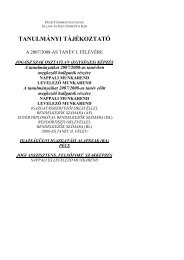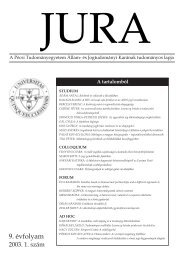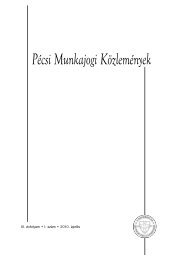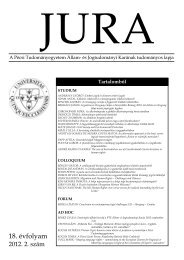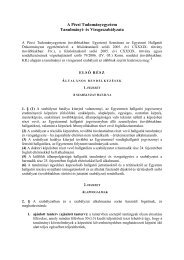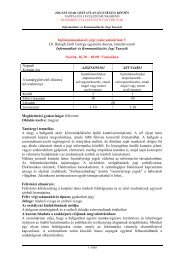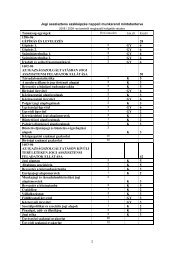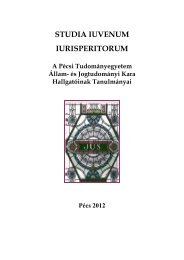2004. évi 2. szám - Jura - Pécsi Tudományegyetem
2004. évi 2. szám - Jura - Pécsi Tudományegyetem
2004. évi 2. szám - Jura - Pécsi Tudományegyetem
Create successful ePaper yourself
Turn your PDF publications into a flip-book with our unique Google optimized e-Paper software.
154<br />
István Horváth: Light and shadow<br />
position to be in line with the interpretation of the<br />
European Court. The rulings – which may even be<br />
unconsummated in certain member states – were<br />
also reacted to by the Commission. In September<br />
2003 all member and candidate state representatives<br />
were invited to Brussels. The aim of the invitation<br />
was not the strengthening and accepting of the<br />
reasoning of the court rulings. To the contrary – the<br />
administration in Brussels – after a short assessment<br />
of the situation in the member and candidate states<br />
– made a contradictory proposal. The harmonization<br />
of European labor law has its eyes on two interests:<br />
More flexible employment and the consideration of<br />
employee interests. The Commission proposal has<br />
three elements: the possibility of one-year reference<br />
periods as a general rule, the possibility of disregarding<br />
certain inactive periods when calculating the<br />
weekly 48 hour limit of working time, and, finally,<br />
– as the price paid for more flexibility – the deletion<br />
of opt out, or at least the introduction of stricter rules<br />
in connection with it. Either the amount of working<br />
time should not exceed 48 hours a week – this would<br />
cause serious work organizational problems with<br />
respect to stand-by jobs, and in the health sector,<br />
or – and this would be more favorable for us – the<br />
opt out would be made stricter, so it would not be<br />
enough to have an agreement between the parties<br />
on the increase of the 48-hour working time. It is a<br />
reasonable criticism that the agreement itself does<br />
not provide a sufficient guarantee, since it might<br />
happen that employers might only be ready to enter<br />
into work contracts which specify a weekly working<br />
time in excess of 48 hours. That means that the requirement<br />
that the agreement is voluntary included<br />
in the directive becomes formal, the agreement on<br />
the working time extension becomes a condition of<br />
employment.<br />
According to an informal statement of the Commission,<br />
by the end of summer the final proposal of<br />
the Commission will be elaborated, from which a<br />
new line of the Union labor law legislation may issue.<br />
According to an Austrian professor, the Union’s<br />
economic policy is aiming towards liberalization.<br />
The question is whether this aim will also be found<br />
in European Union directives in the future.<br />
3. Finally, I would like to mention one of the<br />
newest European Union challenges, the member<br />
state’s takeover of the provisions of the agreement<br />
of European social partners which have not been<br />
announced in a directive. In 2002 in Bruxelles the<br />
European Trade Union Confederation (ETUC) and<br />
two employer organizations on the union level concluded<br />
a framework agreement on telework. In my<br />
opinion the said agreement is crucially important<br />
as it stipulates that telework qualifies as an employment<br />
relationship. Consequently, in itself, the fact<br />
that the employee performs work in his/her own<br />
home, in accordance with his/her general working<br />
time schedule, does not qualify the employment<br />
relationship as a civil law relationship. I think the<br />
profession of a lawyer can be performed as telework,<br />
as telework may be constituted by sitting in a park,<br />
using a lap-top and sending documents to the employee<br />
by way of an email. My cousin works in Paris<br />
at an international telecommunication company. In<br />
the company’s experience, male employees are much<br />
more efficient at home on Mondays without shaving<br />
as opposed to where they are performing their work<br />
in their office under the pressure of stress. The implementation<br />
of the agreement – not announced in a<br />
directive – depends on the level of the social dialogue<br />
of the Member States. In Hungary less than half of<br />
the employees work under the scope of a collective<br />
agreement, so the rules of telework became part of<br />
the Labor Code because of the active participation of<br />
the state. The said rules entered into force on the 1st,<br />
May, on the day when Hungary became a Member<br />
State of the EU. The rules of telework can be said to<br />
be significant because the changing of technological<br />
conditions allow the changing of the definition of the<br />
workplace in several professions. The subsequent<br />
consequence of this could be the changing of the<br />
traditional labor rules.<br />
In several opinions on the legal harmonization,<br />
the strained tempo did not take into consideration<br />
the internal, national circumstances. The duality. The<br />
light: each Member State fulfilled the requirements of<br />
the EU. The shadow: the internal, national problems.<br />
Labour law became independent as a result of<br />
industrial revolution. The explosive change in technology<br />
in the recent past has amended the conditions<br />
so much that the main institutions of labour law have<br />
to be re-examined. Success requires the service of two<br />
masters, i.e. flexibility and employee-friendliness. Or<br />
– as people say it – that certain golden midway has<br />
to be found, creating a balance between capital and<br />
profit and human beings, families and private lifes.<br />
Let me complete the article with a personal,<br />
subjective metaphor. The success of an orchestra<br />
depends on whether the songs are understandable<br />
for the audience. The value of a law depends on<br />
how it operates in practice. As for the orchestra, the<br />
constituter of a regulation only sets the framework,<br />
the success depends on the medium.<br />
JURA 2004/<strong>2.</strong>



